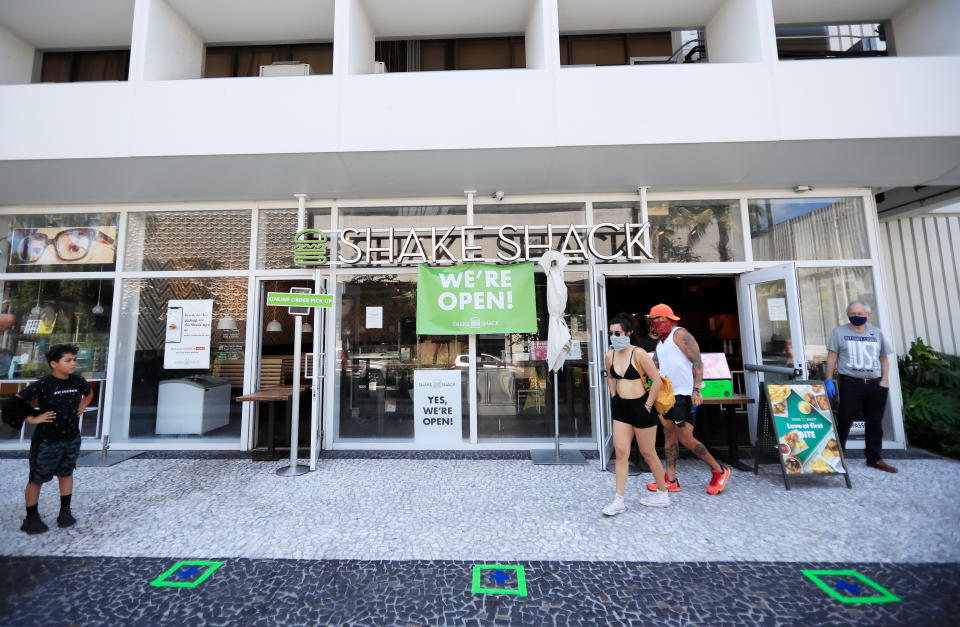Why chains like Shake Shack, Ruth's Chris, Potbelly qualified for PPP small business loans
The initial $349 billion pool for the government’s Paycheck Protection Program ran out last Thursday after just 13 days, and when the dust had settled, many people expressed outrage to learn that large restaurant chains including Ruth’s Chris Steak House, Shake Shack, and Potbelly Sandwich Shop had all received PPP loans, when so many much smaller businesses were shut out and are desperately waiting for the program to get another round of funding.
Potbelly (PBPB) has more than 400 locations and had $409 million in revenue last year. Shake Shack (SHAK) has 189 locations and 8,000 employees, and had $595 million in revenue last year. Ruth’s Chris (RUTH) has 150 locations (75 are owned by franchisees), 5,740 employees, and had $468 million in revenue last year. All three are publicly traded.
The backlash got loud enough, quickly enough, that Shake Shack CEO Randy Garutti and Union Square Hospitality Group CEO Danny Meyer posted a letter on LinkedIn on Sunday night announcing Shake Shack will give back its PPP loan. The gist of the post is that Shake Shack had to apply for PPP quickly, since no one knew how soon the $349 billion would run out, and then was able to raise relief money by issuing $140 million of new Class A shares instead.
“Our people would benefit from a $10 million PPP loan but we’re fortunate to now have access to capital that others do not,” Meyer and Garutti wrote. “Until every restaurant that needs it has had the same opportunity to receive assistance, we’re returning ours.”

On social media, many people are still asking why, exactly, such large chains were able to qualify for small business relief in the first place. The PPP defined small businesses as companies with fewer than 500 full-time employees.
The answer is that the PPP language had a carveout for restaurants and hotels regardless of their number of employees. The National Restaurant Association supported and lobbied for that exemption. Potbelly and Shake Shack each got a $10 million PPP loan thanks to the exemption. Ruth’s Chris got $20 million, even though the loans were capped at $10 million, by applying for two subsidiaries. (Other chains that got large PPP loans include Taco Cabana, which got the maximum $10 million, and J. Alexander, which got $15.1 million by applying for two subsidiaries.)
Shake Shack’s LinkedIn post appears to suggest that disgruntled people should blame the government, not the chains that took advantage of the exemption. (“The PPP came with no user manual and it was extremely confusing,” the Shack Shack executives write.)
Critics may not buy that excuse (many saw the post as a P.R. move aimed strictly at ending negative attention), but it’s a fair point: the PPP rollout was extremely flawed, characterized by confusing guidelines that kept changing, website outages, long response times from big banks, and aggravation for many applicants.
Florida Sen. Marco Rubio admitted as much in a Twitter video on Monday addressing the controversy over big chains getting in.
“Everyone agreed that we wanted to open this up to more than just the traditional small business... that’s why we expanded this to include restaurants and hotels who are part of chains,” Rubio said. “I think unfortunately there probably are a couple companies who qualified for this, and entities who qualified for this, who were not what we intended. And that’s a certification issue that I hope is going to be tightened up by new regulations. That said, the only comfort we should take is this is not a bailout. None of these companies are getting a bailout. What they’re getting is money that has to go to pay their employees, to pay rent, and to pay utilities. But it’s not money for their shareholders. But it is money that could have gone to 15 smaller businesses.”
The key phrase there is that Rubio would like to see the guidelines change in the next round—thousands of small-business owners across America are hoping there’s a next round of PPP, and that they’ll get in the door next time. The Trump administration and Congress are expected to reach agreement this week on an another aid package to boost the loan program.
—
Daniel Roberts is an editor-at-large at Yahoo Finance. Follow him on Twitter at @readDanwrite.
Read more on the Paycheck Protection Program for small businesses:
The $349 billion coronavirus small business loan program is out of money after 13 days
These 4 businesses that have actually received PPP money have 1 thing in common: small banks
‘Nightmare’: 3 small business owners describe process of applying for PPP loans
Banks were not prepared for flood of small business coronavirus loan applications
Chef Marcus Samuelsson on coronavirus: ‘Where restaurants go away, so goes all small businesses’

 Yahoo Finance
Yahoo Finance 
